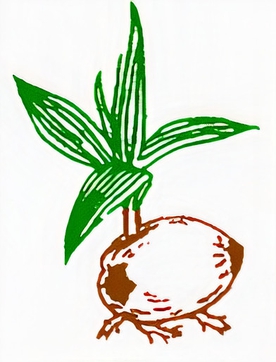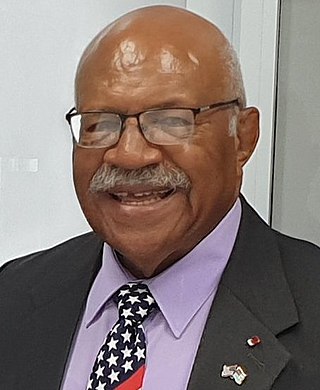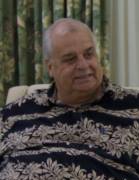Related Research Articles

The politics of Fiji take place within the framework of a parliamentary representative democratic republic. Fiji has a multiparty system with the Prime Minister of Fiji as head of government. The executive power is exercised by the government. Legislative power is vested in both the government and the Parliament of Fiji. The judiciary is mostly independent of the executive and the legislature.

Mahendra Pal Chaudhry is a Fijian politician and the leader of the Fiji Labour Party. Following a historic election in which he defeated the long-time former leader, Sitiveni Rabuka, the former trade union leader became Fiji's first Indo-Fijian Prime Minister on 19 May 1999, but exactly one year later, on 19 May 2000 he and most of his Cabinet were taken hostage by coup leader George Speight, in the Fiji coup of 2000. Unable to exercise his duties, he and his ministers were sacked by President Ratu Sir Kamisese Mara on 27 May; Mara intended to assume emergency powers himself but was himself deposed by the military leader, Commodore Frank Bainimarama.

Laisenia Qarase was a Fijian politician. He served as the sixth Prime Minister of Fiji from 2000 to 2006. After the military quashed the coup that led to the removal of Mahendra Chaudhry, Qarase joined the Interim Military Government as a financial adviser on 9 June 2000, until his appointment as Prime Minister on 4 July. He won two parliamentary elections, but a military coup removed him from power on 5 December 2006. He was later imprisoned on corruption charges brought by the military-backed regime.

The Fiji Labour Party, also known as Fiji Labour, is a political party in Fiji. Most of its support is from the Indo-Fijian community, although it is officially multiracial and its first leader was an indigenous Fijian, Dr. Timoci Bavadra. The party has been elected to power twice, with Timoci Bavadra and Mahendra Chaudhry becoming prime minister in 1987 and 1999 respectively. On both occasions, the resulting government was rapidly overthrown by a coup.

The United Fiji Party was a political party in Fiji. It was founded in 2001 by Prime Minister Laisenia Qarase as a power base; it absorbed most of the Christian Democratic Alliance and other conservative groups, and its endorsement by the Great Council of Chiefs (Bose Levu Vakaturaga) caused it to be widely seen as the successor to the Alliance Party, the former ruling party that had dominated Fijian politics from the 1960s to the 1980s. It drew its support mainly from indigenous Fijiians.

Sitiveni Ligamamada Rabuka is a Fijian politician, former soldier and former sportsman who has served as Prime Minister of Fiji since 24 December 2022. He was the instigator of two military coups in 1987. He was democratically elected as Prime Minister of Fiji, serving from 1992 to 1999, and again in 2022, leading a three-party coalition. He also served as Chairman of the Great Council of Chiefs from 1999 to 2001, and later as Chairman of the Cakaudrove Provincial Council from 2001 to 2008.

Josaia Voreqe "Frank" Bainimarama is a Fijian former politician and naval officer who served as the prime minister of Fiji from 2007 until 2022. A member of the FijiFirst party, which he founded in 2014, he began his career as an officer in the Fijian navy and commander of the Fijian military. Despite being suspended from Parliament, he served as the opposition leader from 24 December 2022 until 8 March 2023, when he resigned and was replaced by Inia Seruiratu.

The National Federation Party is a Fijian political party founded by A. D. Patel in November 1968, as a merger of the Federation Party and the National Democratic Party. Though it claims to represent all Fiji Islanders, it is supported, in practice, almost exclusively by Indo-Fijians whose ancestors had come to Fiji between 1879 and 1916, mostly as indentured labourers. However, in the 2018 general election, the party recorded a considerable change in its support base due to the inclusion of more indigenous Fijian candidates.

Poseci Waqalevu Bune was a Fijian civil servant, diplomat, politician and Cabinet Minister. He served as chair of the Public Service Commissioner, secretary to the Prime Minister, and as Fiji's permanent representative to the United Nations, as well as a Cabinet Minister in the governments of Mahendra Chaudhry and Laisenia Qarase, and in the military regime of Frank Bainimarama. Bune died of prostate cancer on 22 November 2023, at the age of 77.
RatuMeli Bogileka is a Fijian politician. He was the Secretary of the People's National Party (PNP) up to its decision to merge into the Party of National Unity (PANU) on 5 March 2006. This merger, an affair complicated by several about-turns, saw Bogileka appointed Secretary of the new PANU..

Rose Lavenia Bernadette Rounds Ganilau, born July 5, 1951, as Lavenia Bernadette Rounds, is a Fijian writer, broadcaster, and politician, who served as Minister for Labour, Minister for Tourism, Industrial Relations, Productivity and Environment in the interim Cabinet of Commodore Frank Bainimarama, having been appointed on 9 January 2007. In previous political roles, she served in 2000 and 2001 in the Interim Government of Prime Minister Laisenia Qarase as Assistant Minister for Social Welfare, and from June to December 2006, she was Deputy Leader of the Opposition and Chairperson of the Public Accounts Committee of the House of Representatives, until the military coup of 5 December.

Mick Malcolm Millis Beddoes, widely known as Mick Beddoes, is a Fijian politician and businessman from Nadi, who led the United Peoples Party from 2000 to 2013, and was the Leader of the Opposition at the time of the military coup of 5 December 2006. He was also the Chief Executive of the World Netball Company, and was Chairman of the organising committee for the 2007 World Netball Championships, but announced his resignation on 24 January 2006, citing a possible conflict of interest, as his company would be working as a ground operator during the championships.
Kenneth Vincent Zinck is a former Fijian trade unionist, politician and Cabinet Minister, who served as Minister of Labour in the government of Laisenia Qarase from 2001 to 2006. In the aftermath of the 2006 Fijian coup d'état he sought political asylum in Australia.

General elections were held in Fiji between 6 and 13 May 2006.
Pramod Kumar Rae is a Fijian trade unionist and political organizer of Indian descent. He was born in Suva and completed a Bachelor of Arts degree and Post Graduate Certificate in Education from the University of the South Pacific.

The Fijian coup d'état of December 2006 was a coup d'état in Fiji carried out by Commodore Frank Bainimarama against Prime Minister Laisenia Qarase and President Josefa Iloilo. It was the culmination of a political crisis that had begun the previous year when the Qarase government introduced three bills to the Fijian Parliament. The Qoliqoli, Land Tribunal, and Reconciliation, Tolerance, and Unity Bills dealt with the ongoing ethnic conflicts in Fiji and the aftermath of the 2000 coup, and were considered to be pro-ethnic Fijian. Bainimarama, the Commander of the Republic of Fiji Military Forces (RFMF), presented the government with a list of demands on October 16 that included withdrawing the bills. Attempts at negotiation failed and the military launched a coup on 4 December. Parliament was dissolved, Qarase and his cabinet were dismissed, and some civilian officials were placed under house arrest. After the Great Council of Chiefs refused to appoint a cabinet friendly to the military, Bainimarama reached an understanding with Iloilo and reinstated him as President on 4 January 2007. Iloilo then appointed Bainimarama acting Prime Minister in charge of the Interim Cabinet.

General elections were held in Fiji on 17 September 2014 to select the 50 members of Parliament. The FijiFirst party, led by Prime Minister Frank Bainimarama, won a landslide victory, winning 32 of the 50 seats. The Social Democratic Liberal Party and the National Federation Party were the only other two parties to cross the 5% electoral threshold and win seats.
Sugar Cane Growers Council represents the sugar cane farmers in Fiji. It is made up of 38 members elected by the farmers and eight members nominated by the government. The Sugar Cane Growers Council election is held every three years. The Council has a chief executive, the first one being Vijay R. Singh, and a chairman.
Josaia Waqabaca is a Fijian public figure and former political organizer, who turned police informant about the Fiji coup of 2000. Waqabaca was convicted and imprisoned in 2001 for plotting to kidnap the Military Commander, Commodore Frank Bainimarama, in 2000.
References
- 1 2 3 "Unionist Attar Singh joins NFP line-up". Fiji Sun. 3 October 2018. Retrieved 30 May 2023.
- ↑ "Time For A Break: Singh". Fiji Sun. 23 September 2014. Retrieved 30 May 2023.
- ↑ "Fiji military detain trade union official overnight". RNZ. 16 January 2007. Retrieved 30 May 2023.